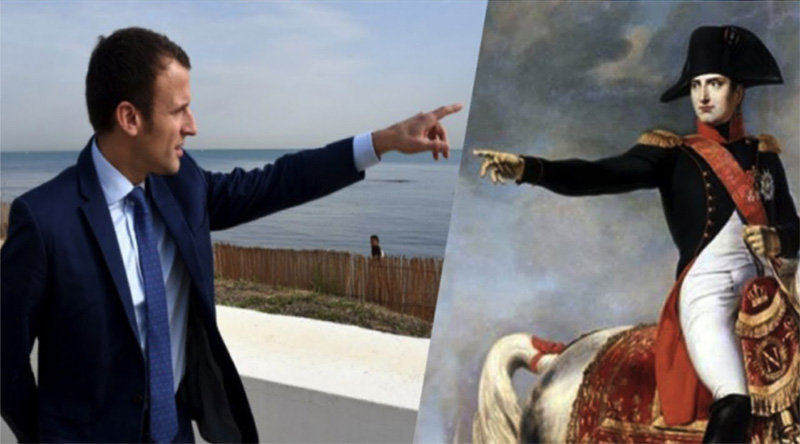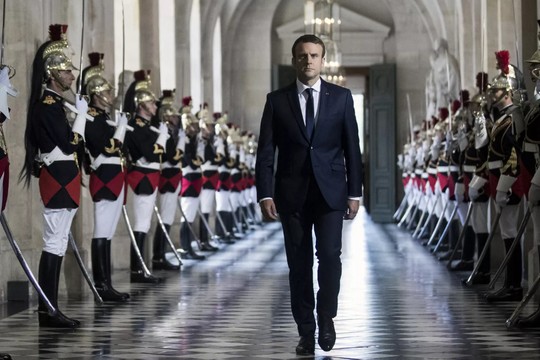The French President Emmanuel Macron
Ever since its ignominious defeat in the Napoleonic wars, France is entrapped in the predicament of countries that get sandwiched between great powers. Following the World War II, France addressed this predicament by forging an axis with Germany in Europe.
Caught up in a similar predicament, Britain adapted itself to a subaltern role tapping into the American power globally but France never gave up its quest to regain glory as a global power. And it continues to be a work in progress.
The angst in the French mind is understandable as the five centuries of western dominance of the world order is drawing to a close. This predicament condemns France to a diplomacy that is constantly in a state of suspended animation interspersed with sudden bouts of activism, writes M.K. Bhadrakumar, Indian Ambassador and prominent international observer.
The French President Emmanuel Macron’s halcyon days in international diplomacy ended with the recent dissolution of the Franco-German axis in Europe, which dated back to the Treaties of Rome in 1957. As Berlin sharply swerved to trans-atlanticism as its foreign-policy dogma, France’s clout diminished in European affairs.
Of course, this is not to decry Macron’s formidable intellect — such as when he declared in a blunt interview in late 2019 with the Economist magazine that Europe stood on “the edge of a precipice” and needed to start thinking of itself strategically as a geopolitical power lest it will “no longer be in control of our destiny.” Macron’s prescient remark preceded the war in Ukraine by 3 years.
According to the newspaper Marianne, which interviewed several French soldiers, the military reportedly estimates that the Ukraine war is irretrievably lost already. Marianne quoted a senior French officer saying derisively, “We must make no mistake facing the Russians; we are an army of cheerleaders” and sending French troops to the Ukrainian front would simply be “not reasonable”. At the Élysée, an unnamed advisor argued that Macron “wanted to send a strong signal… (in) milli-metered and calibrated words”.
But, until fairly recently, Macron was a supporter of dialogue with Moscow. The perception in most European capitals, including Moscow, is that Macron is making an attempt to bring the Ukrainian crisis to a new level by announcing western combat deployment against Russia publicly as an obvious political manipulation.
The geopolitical salience is that Macron who once called for dialogue with Moscow and offered his mediation in it, who made the famous declaration of a “Greater Europe” in 2019 and maintained contacts with Russian President Vladimir Putin thereof; who and as of February last year, while speaking on Russia’s “certain defeat” in Ukraine, called for avoiding Moscow’s “humiliation”; who repeatedly underscored his commitment to the matrix of diplomacy attributed to Charles de Gaulle, which assigned France the role of a “bridge between East and West” — has now swung to the other extreme of harsh Euro-Atlantic rhetoric.
This can only be seen as stemming out of the unfavourable development of events in the scenario of the Ukrainian crisis with the prospect of a Russian defat in the war disappearing and replaced by the growing possibility that peace will ultimately be attainable only on Russia’s terms. Put differently, the power dynamic in Europe is shifting dramatically, which of course, impacts Macron’s own ambitions to “lead Europe.”
Meanwhile, Russian-French relations have also been undergoing a stage of fierce competition and rivalry — even confrontation — in a number of areas. For a start, French Foreign Minister Stephane Sejournet, said in an interview with Le Parisien in January that Russia’s victory in Ukraine would lead to 30% of world wheat exports being controlled by Moscow. For Paris, this is a question of the sustainability of one of the key sectors of French national economy.
As it is, African states are changing the structure of grain imports due to the technical regulations introduced by the European Union as part of its green agenda and French farmers consequently face rising costs, and over and above that, there is now also the looming loss of regional market share to Russia.
This is on top of the inroads Russia is making in arms exports to the African continent lately. In politico-military terms too, France has lost ground to Russia in the resource-rich Sahel region, its playpen traditionally. The fact of the matter is that the birds are coming to roost over France’s neo-colonial strategies in Africa, but Paris prefers to put the blame on Russia’s Wagner group which has moved in to fill the security vacuum in Sahel region, as anti-French forces have come to power in several countries at once — Mali, Niger, Burkina Faso, Chad, CAR.
In the best traditions of geopolitics, France has begun retaliating in regions sensitive to Russian interests — Armenia, Moldova and Ukraine where Russian military presence is in French crosshairs. Unsurprisingly, Ukraine is the most strategic turf where Macron hopes to achieve a bigger French presence.
Through that, Macron hope to advance his leadership ambitions in Europe as the navigator of the EU’s foreign policy strategy in a wide arc from the African continent across the Mediterranean to Transcaucasia — and potentially to Afghanistan.
All this is unfolding against the historic backdrop of an inevitable US retrenchment in Europe as Indo-Pacific hots up and the rivalry with China becomes an all-consuming obsession for Washington. Indeed, the towering presence of Russia across Europe is beginning to be felt intensely as it surges as the number one military and economic power in the strategic space between Vancouver and Vladivostok, notes M.K. Bhadrakumar.
 Macron's dream is to play the role of the “new Napoleon”
Macron's dream is to play the role of the “new Napoleon”
read more in our Telegram-channel https://t.me/The_International_Affairs

 12:50 18.03.2024 •
12:50 18.03.2024 •























